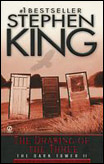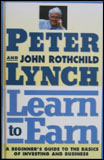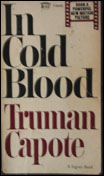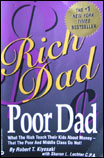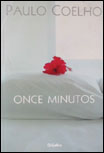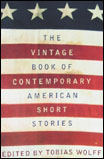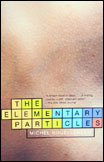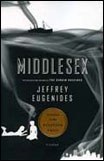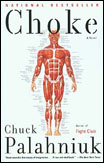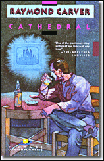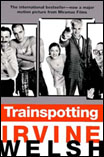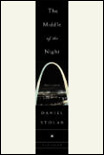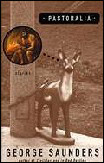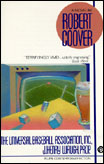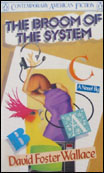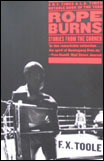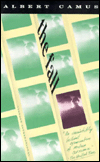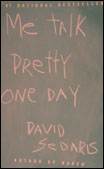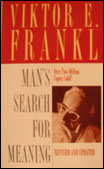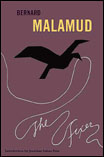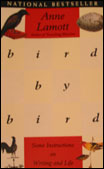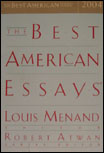| Home | Writings | Readings | About Me | Blog |
"If you want to be a good writer you have to do two things-read a lot and write a lot." - Stephen King |
This is the new and updated readings page.
If you want to see the older readings, click here.
|
-Just
for fun |
|
-Politics
and/or terrorism |
|
-Self
Help |
|
-Scholarly
or textbook-type |
Consider the Lobster
by David Foster Wallace |
This is DFW's latest book, I got it the morning it came out. The thing is, I read most of these essays already in the different magazines they first appeared in. So I only re-read the ones that were drastically different or changed. And the new ones of course. First, on the ones I had already read (Host, Big Red Son, Up Simba!, Consider the Lobster): They are fantastic. The same way that the Cruise essay carried the first book (A Supposedly Fun thing...), all these do the same, making it a powerful book. That he can go into all these varying topics the way he does is really something else, especially the depths he goes to for each. Even the one about American Usage, which was hard to follow during certain parts, had me cracking up and underlying things left and right. Some of the stuff is tough to get through, but those that do will be rewarded. Realization: I was going to give this 3.5 peanuts but as I went through in search of a quote let me instead say that this is gold, go buy this book. |
|
My Friend Leonard
by James Frey |
Part two of James Frey's memoir, he uses the same powerful style to tell the story of his getting out of jail and going to Chicago. He lives there for a while and winds up in LA. If you read the first one (by God, do it already!) then you have to read this too. It's just amazing. I especially enjoyed certain parts because they happened in Chicago, and probably not far from where I live. It really reminded me of what a great city this is to live in. Anyway, he's still fighting addiction but now has bigger issues to deal with: love, relationships, job, money, future, etc. His relationship with Leonard is one of father and son and you're there with him as he enjoys the "high" life every time Leonard visits him. Frey's been getting bashed a lot by some people who claim he's made things up, and while I don't think he did, they should just enjoy the ride because this is an incredible book. Favorite Quote: "I'm a lucky man. A lucky man. Lucky motherfucky." |
|
The Drawing of the Three
by Stephen King |
This is part two of the Tower series and after such a great book it's really not fair to judge this book in comparison. But I had to, it's a continuation of the first. This one takes place more in the "real world," which is something I've noticed about King. As weird and out there as you'd think he is, all his stories are based and really happen in the world we all live in. Some of the pages in this one were just horrible and I was embarassed to be reading them on the train and bus. Cheesy, cliche, all kinds of things that I don't like to read. Then his own advice came to me, from his book On Writing, about how reading a bad book can be good. You learn what not to do next time you sit down to write. I've been told it gets better, that most of the story goes back to Roland's world, and it better because I already bought the next two. Small reason for the 1.5 peanuts: "'I will.' He kissed her again, hurriedly this time, and almost told her to be careful...but seriously, folks, how careful could she be, with the situation what it was?" |
|
The Gunslinger
by Stephen King |
||
Independence Day
by Richard Ford |
||
The Sportswriter
by Richard Ford |
||
My Bloody Life
by Reymundo Sanchez |
||
Brief and Frightening Reign of Phil
by George Saunders
|
||
A Million Little Pieces
by James Frey |
||
| Shutter Island
by Dennis Lehane |
||
| Learn to Earn
by
Peter Lynch and John
Rothchild |
One of the books that Kiyosaki reccomends was written by this duo, and this is one is more of an introductory book to investing. It has a lot more meat than Rich Dad Poor Dad. It details your options for investing: stocks, bonds, mutual funds, CDs, money market accounts, etc. It tells you about inflation and its relation to investing. It's written for the layman to understand, which is why John Rothchild is listed as an author. I'm sure he's the one to thank for the clarity and ease of understanding. While the book is a little outdated (it came out in 1995), it still gives you a nice, easy to understand, introduction to the world of investments. The ninety or so pages on the history of capitalism is also interesting and gives a good perspective about how the market works today. If you don't know anything about investing, this is a great place to start. |
|
In Cold Blood
by Truman Capote |
This is a book I've been meaning to read for a long time. It's famous because it was the first true-crime book out there (it was written in 1940). It deals with the murder of a prosperous, well-liked family in Holcomb, Kansas. What is amazing about the book is the amount of research Capote had to have done to put it all together. While the story is told in the guise of a novel, you can tell that Capote based himself on facts, and he has tons of them. This is NOT a novel, so don't expect some thrilling twist near the end to throw you off and to surprise you. Perhaps that was the biggest surprise: after the building of the tension things just keep happening in what seems like a very standard, boring way. This is real life, not some made up story, and that's what makes this book special. It also reveals a lot about small towns and the way people lived (and live) in small, close communities. The writing is very clear and precise, making it easy to follow the story. When the suspects are finally caught and interviewed, it kind of reminded me of the Nuremberg Trials. "I thought he was a very nice gentleman. Softspoken. I thought so right up to the moment I cut his throat." |
|
Rich Dad, Poor Dad
by Robert Kiyosaski |
A friend of mine lent me this book and I read it in two days. I knew it was one of the biggest best-sellers around, it's been selling since it came out in 1997 - yet I had never bothered to read it. I had a little background on it, I'd seen some of the guy's infomercials. Turns out the book changed the way I thought about money. This isn't going to make you rich, it's going to tell you some very basic things that a lot of people already know about personal finances and creating income. But if you're like me, you didn't know this stuff, basic as it is, which backs up one of his points in the book: that most people are ignorant about financial matters. This is a good book to get you to see the light and to spur you into educating yourself about investing, saving, and managing your monies. Sometimes he gets a little full of himself, which makes him sound like an arrogant teenager. Plus, this edition I read (even though it's the 28th) is horrible written, with tons of editing mistakes and repetitions. Still, it could prove valuable if it spurs you to educate yourself. Good advice: He claims the main management skills you need to succeed are: the management of cash flow, of systems, and of people. |
|
The Last Carousel
by Nelson Algren |
This is a collection of Algren stories, essays, and experiences that he had while traveling as a journalist. This is really the first time that I really felt the impact of him as an author "for the people." While I had read this about him, I'd never experienced it for myself. Some of the stories in here were interesting, even entertaining. Most, however, were too complicated with too many details. I found myself wondering what the hell was going and why many times in the stories. More interesting were some of his experiences as a journalist, especially in Saigon, Butte, and what I assume is Morrocco. The first story, the one about boxing, was a deceptive tease of what was not to come in the rest of the book. Towards the end, I found myself yearning to be done with the book and begin something else. The good: horse racing, baseball, outlaws. Favorite Quote: "Nobody can become anybody until life has pressured him into becoming somebody. And as becoming somebody is a solitary process, not a group-venture, so art is a solitary process - not a field-trip in pleasant company." |
|
Once Minutos
by Paulo Coelho |
This is probably the end of the road between Coelho and I. It seems that with every book of his I read, the less and less I enjoy what I'm reading. I start to see a lot of his inconsistencies and tricks, and it just annoys the hell out of me. This one is about a prostitute named Maria, and she isn't really a character, Coelho instead decides to construct a person out of every cliche and stereotype you've ever heard regarding prostitutes, men, sex, and anything else you can think of. I hate to say it, but this book annoyed the hell out of me from about page fifty. I'm starting to think that Coelho is a writer for teenage readers, although I never thought that of The Alchemist. Maybe that was because it was my first exposure, although I doubt it, that was just a great book. Crap you can expect: "Cuando su mano me llevo al cuarto orgasmo, entre en un lugar en el que todo parecia en paz, y en mi quinto orgasmo conoci a Dios." |
|
The Vintage Book of Contemporary American Short Stories
edited by Tobias Wolff |
I had a bunch of stories in this book assigned to me for a fiction workshop class. If you like reading short stories or are interested in writing short stories, then this is a good place to go to. There are a total of thirty-three stories, including some classics like The Things they Carried, Cathedral, and Rules of the Game. There are a good variety of stories, each with different styles. For those of you that don't like to get stuck with just one style throughout a collection of short stories, this is a good option. My favorite stories are: Cathedral, Talk of Heroes, Tall Tales from the Mekong Delta, Rock Springs, Emergency, Men Under Water, and Lawns. There are some really great stories here and this book gives you a fair share of stories you will surely like, some you may not, and the rest will be stories you would probably not have read if not for this book, and you'll be glad. Favorite Quote: (From the introduction): "Jack Yeats described writing as 'the social act of a solitary man.'" |
|
The Elementary Particles
by Michel Houellebecq |
First of all, let's make it clear that this is a book about ideas; it's about philosophy. It is NOT a novel. Sure, it's dressed like a novel and it does follow characters in a storyline-type format. But this is not what you think of when you think of a novel. It feels like you are reading transcripts of two very intelligent, very dull people who do nothing but think about philosophy. Some of the ideas are interesting, some of them are not, and some of them aren't even clear enough to think about. This book caused a stir when it came out in France back in 1998, but I have no idea why. I tried to get some background on this but I'm still unsatisfied. The book does have some interesting aspects like the idea of the genome being mapped, the impact it can have on humans as social beings. It feels like there is an uneasy balance between humans as animals and humans as thinking beings. In case you feel lost, all the important or "key" words are italicized. Representative Quotes: "All in all, nature deserved to be wiped out in a holocaust - and man's mission on earth was probably to do just that." "For the most part, however, they could feel a gray shadow moving over them, on the earth that supported them, and in everything they could glimpse the end." |
|
Middlesex
by Jeffrey Eugenides |
I really wanted to give this four peanuts, I really did. This was a fantastic novel, one that I really enjoyed, all 528 pages. It felt like I hadn't read a "normal" novel in a long time, whatever normal means. This is from the guy that wrote The Virgin Suicides, and he won the Pulitzer for this book. Forget what it's about, the writing is spectacular. The storytelling allows you access to everything and everyone's mind. It's about immigration, history, sex, tradition, race, and so much more. The only thing that kept me from giving this a perfect score was the present-tense story from which we're told everything that happened previously. At first, I liked it; but when I finished I didn't feel it fit in all that well. It was kind of left hanging. But please, this is being picky because this is a spectacular novel and I will recommend it to everyone. The mixture of literary and scientific language fits in seamlessly. The research and heart put into this book just really appealed to me, on top of everything else. What a work. Favorite Quote: "Talent is a kind of intelligence." "The only way we know it's true is that we both dreamed it. That's what reality is. It's a dream everyone has together." |
|
Choke
by Chuck Palahniuk |
This is from the guy that wrote Fight Club. This book starts out kind of slow, but eventually it picks up with the anti-consumerist zest that made Fight Club so big. The story is about a guy who chokes in restaurants to make enough money to keep his mother in an old-folks home. He's also a sex addict. The story itself is good, its interesting and captivating. But what jumped out at me was the language. The voice that Palahniuk has created is very unique and consistent throughout. It's also hilarious. The us of "dog" and "dice" was classic. There are some moments that are just plain hysterical, including all of chapter 25. There are also a bunch of moments that sounded exactly like George Saunders - language-wise as well as content-wise. Weird. There's a great twist nearing the end and overall my impression was satisfactorily. Favorite Line: "Every addiction, she said, was just a way to treat this same problem. Drugs or overeating or alcohol or sex, it was all just another way to find peace. To escape what we know. Our education. Our bite of the apple." |
|
Cathedral
by Raymond Carver |
This is supposed to be the most sold collection of stories ever, something like that. The idea is, this author and this book is way up there when it comes to short stories. And you can tell. I liked the simple, short, one word titles that hinted at so much more once you finished the stories. Cathedral, the title story, was in an anthology and I really like it. Other than that, I think my favorite was probably The Compartment. There is something in these stories, something deep that is being intimated at in such a subtle, poignant way that's really amazing. The first story (and some moments in others) reminded me of George Saunders, though I guess it should be the other way around since Saunders came way after Carver. Anyway, the topics in these stories go from drinking, children, and settling down. These stories aren't made to just cruise through and enjoy - although that's entirely possible. You'll find yourself having to sit down and think about each story for a while to really "get" what it was about. I like this. Favorite Line: "She stared at his feet next to the pool of water. She knew she's never again in her life see anything so unusual." |
|
Trainspotting
by Irvine Welsh |
Another drug book, in a sense. I had heard of the movie a few times before but I had never seen it. Tollo turned me onto this book and I'm glad he did. First of all, it's a very entertaining read. The story of these young, Scottish guys living their "lives" while trying to maintain or kick their heroin addictions is very compelling. Also, it's written in the Scottish accent, which gives you the sound of the characters, which is very important. Also, this book has some great instances where I learned about writing. Nothing major, but lots of brief instances where I thought to myself, "Oh, that's a way of doing this." Kind of like The Things They Carried, only this is much more edgy and contemporary. It isn't just a novel from beginning to end, it's a series of short stories that are linked together by the same characters. But the point of view changes often, and I sometimes had trouble keeping track of who was who or how they were different. It's a very good book and it has inspired me quite a bit. Favorite Line: "We are acquaintances now." "Smack's an honest drug, because it strips away these delusions. Wi smack, whin ye feel good, ye feel immortal. Whin ye feel bad, it intensifies the shite that's already thair...Eftir that, ye see the misery ay the world as it is, and ye cannae anaesthetise yirsel against it." |
|
| The Middle of the Night
by Daniel Stolar |
I actually took a class with Stolar, and that's how I came upon this book of stories. There are eight stories and they are all character-driven. Topics range from cancer to race and ethnic relations. There is some basketball in there too. It's entertaining to read fiction from a professor you've taken a class with. Knowing some details about him make it a much different read than any other random author. There is a touch of loneliness, of sadness, of being alone in the world. But in this there is also acceptance and finding more meaning. Crossing Over is probably my favorite story and it's funny because he told us that it wasn't originally in the book. He only wrote it after the book was bought and he knew the story had a home. It's a wildly entertaining story and amazing when you consider that he made it all up - he never pledged to a fraternity, much less a black one (he's a white, jewish guy). His first few stories are a good example of a story that takes a rather simple event like a drive to a class reunion or a family leaving a house interspersed with flashbacks to great effect. I really enjoyed this collection and was impressed with the amount of detail he includes in certain moments - immersing the reader into the world he creates. Favorite Line: "As I walked down between the packed rafters, my face in black, my eyes fixed straight ahead, it was all I could do to keep from facing that black crowd and beat boxing or throwing gang signs, break dancing or hucking and jiving." |
|
| CivilWarLand in bad decline
by George Saunders |
He's quickly becoming a personal favorite of mine. This guy is really good. This is his first collection of stories, before Pastoralia, I think. At least this feels like it was written before Pastoralia. Some of the endings seem like they are rushed into. Not in a terribly bad way, but it seems like Saunders has trouble when it comes to endings, like he doesn't know how to end it so he wraps it up very suddenly. Which doesn't take away from how good these stories are. My favorite? The 400 pound CEO. It seems he likes to write about "pathetic" characters that the reader really empathizes with to the point where we don't see them as pathetic but as part of our own personalities (at least I did) that we root for and try to hide at the same time. So a lot of the time I felt sad for the characters. His voice (Saunders') is really something very unique and I haven't read anything like it anywhere else. I'm curious about what he is like, so I'll read some interviews and do some research and get back to you. In any case, this is very unique fiction, but it's also very good. It's the kind of stories that make you turn off the TV to read, which is a great thing. A Line that sums up Saunders: "I have a sense that God is unfair and preferentially punishes his weak, his dumb, his fat, his lazy. I believe he takes more pleasure in his perfect creatures, and cheers them on like a brainless dad as they run roughshod over the rest of us. He gives us a need for love, and no way to get any. He gives us a desire to be liked, and personal attributes that make us utterly unlikeable. Having placed his flawed and needy children in a world of exacting specifications, he deducts the difference between what we have and what we need from our hearts and our self-esteem and our mental health." |
|
The Nick Adams Stories
by Ernest Hemingway |
This one was recommended to me by my professor after reading a story of mine about Guatemala. As I read through it I wondered where the connection was between my story and this book, but I guess it has to do with telling less and just letting the story talk for itself. This is what Hemingway is famous for and this is what he does here. It's a lot of fun to watch, he's just really that good. He'll lull you to sleep by simply telling you what's happening then he'll sneak in a line like "It's just no good doing a thing too long." And that'll make you stop and think about what the story is all about. I think Hemingway works a lot better in the short story form, at least I seemed to have enjoyed this much more than The Sun Also Rises - but that could be because I didn't "get" him yet. The stories are also semi-biographical, Nick Adams having gone through a very similar life as Hemingway did, so it's interesting to read some of Nick's insights insofar as how they reflect on Hemingway. As someone who wants to write, Hemingway's style in The Nick Adams Stories (among other books) is very important to me because I seem to be on the other side of the spectrum. I try to tell too much, to make sure my "thing" is getting across - overwriting, basically. Hemingway is on the other end, and it's good to see it done so well; it points to a nice middle ground somewhere in between. Not that it's easy or anything. There is also something about Nick Adams that makes me look at Hemingway as one of those kids who was just better at everything than anyone else. You know the type, the kid that everyone was jealous of but also didn't hate. Favorite Line: "He loved his sister very much and she loved him too much. But, he thought, I guess those things straighten out. At least I hope so." |
|
Pastoralia
by George Saunders |
A professor of mine mentioned this guy after I workshopped a story of mine. I also read a story of his in Harper's and really like it, so I decided to read this collection of stories. If I had to describe it in one word I would say unique. I don't think I've ever read anything like this anywhere else. I guess his thing is about looking at America through the point of view of people with pretty specific issues. For example, the first story, Pastoralia, deals with a guy who works in some sort of amusement park where he works as a caveman, doing things only as a caveman would. But he has to live like this 24 hours a day except for the fax machine in the cave and his partner - who isn't very good at the whole caveman lifestyle. Either way, the book is very entertaining, I loved it. He's a really good writer, his voice seems simple and pretty straightforward - but make no mistake, he's good. He's also funny, so if you're interested in reality TV-type stuff, definitely check this out, it's a similar vibe. Good Line: "I have plenty of friends," she says. "Name one," he says. She looks at me. Which I guess is sort of sweet." |
|
| Fear and Loathing in Las Vegas
by Hunter S. Thompson |
Matt let me borrow this book after we talked about the author a couple of days before he died, it was pretty weird. The book itself is great, mostly because it's a work of non-fiction. It's about a journalist and his attorney going to Las Vegas to "work" - but all they really do is get messed up on all kinds of drugs: weed, mescaline, amyls, cocaine, acid, rum, tequila, and ether. All pretty much at the same time - which explains a lot of what happens in the book, but not everything. The book is an example of what Thompson calls "gonzo journalism," just jumping into whatever he's covering and doing it while on all kinds of drugs. He also wrote one about the Hells Angels, so maybe I'll check that out. I also saw the movie, which was a great job. It was very true to the book and Johnny Depp did an awesome job, as did Benicio del Toro. It's probably the only way I'll ever know what it's like to be on all these drugs - and it's very entertaining. Favorite Line: "This is the main advantage of ether: it makes you behave like the village drunkard in some early Irish novel...total loss of all basic motor skills: blurred vision, no balance, numb tongue - severance of all connection between body and the brain. Which is interesting, because the brain continues to function more or less normally...you can actually watch yourself behaving in this terrible way, but you can't control it." |
|
Universal Baseball Association
by Robert Coover |
I don't really recall how I heard about this book but it probably got my attention since it deals with baseball so much. Although, what it's really about is this guy that is obsessed with his role-playing board game he's created. It's a baseball game, but he's taken it to an obsessive level where his whole life revolves around the game - which itself relies on throws of the dice. This idea of a random fate is imbued throughout the book. It was really strange to read certain parts because I remember when I used to keep a notebook about the goings on of my own league and kind of created my own storylines and player personalities. At the same time it was comforting to see that - while this may have been weird - this guy certainly takes the cake. Stylistically, the way Coover blends the narration and the delusion of the the main character work perfectly to show his issues of blurring reality with fantasy. My only issue with the book was the ending. I understood what happened (I think), but there were a series of references and things that hinted at something greater. I believe there were some parallels to government, communism, god - I'm not sure. Maybe it's just that some previous reader loaded the margins with his own interpretations. Favorite Line: "If he didn't know better, he's suspect the dice of malevolence, rather than mere mindlessness." |
|
Broom of the System
by David Foster Wallace |
This was DFW's first ever novel, written when he was 24 years old. Which is amazing. I put off reading it for so long because I figured it was more of a debut novel in that it wasn't his best stuff and that he was just finding his way as an author. Umm...wrong. It's amazing that this book was written by a 24 year old. It becomes clear that this guy is one hell of a writer. If you've read Infinite Jest you'll recognize some of the techniques and issues that he brings up in Broom. As with most everything Wallace writes, you're left with tons of questions at the end. He doesn't explicitly tell you what actually happened, what the conclusion of the story is - which can be frustrating but I enjoy (again, see Infinite Jest). I enjoyed Broom more that IJ since it felt more accessible to me. Maybe it has to do with it being his first novel, maybe it has to do with my extended exposure to his writing. Either way, a brilliant debut. Makes you laugh, think, think, think, and laugh. As for the plot, it Favorite Line: "He told me he wants to write this book arguing that Christianity is the universe's way of punishing itself, that what Christianity is, really, is the offer of an irresistible reward in exchange for an unperformable service." |
|
Rope Burns
by F.X. Toole |
The reason I got into this book was from seeing the movie Million Dollar Baby. As the movie's credits rolled, it came up that the movie was based on stories from FX Toole. So I went and researched the book (the movie was that good) and, seeing the positive reviews, bought it. It's a great collection of six boxing-related stories - although they're always about much more that boxing (although I am really into boxing so there you go). Someone reviewed this book and mentioned Hemingway as a similar type of writer. I agree to some extent, although Toole seems much more capable of transmitting emotion through the page. I think Hemingway kind of left this under the surface a bit. But the overall style is similar. It's also great that this is his first book, him being in his late sixties I think. It's also interesting that - although the Million $ Baby story is really good, the movie is better, something that doesn't happen often and really a tribute to how good the movie is. Beautiful insight into the boxing world, race issues, and belonging. Favorite Story: Rope Burns. "He hit him with a six-punch combination so pretty it make you dick hard." "Most thought the game was corrupt because of the money. Con saw it otherwise, that there was money because of the corruption." "Watching him fight was like watching chess with pain." |
|
Naked
by David Sedaris |
I liked his first book I read so much I had to go back for more. It's more of the same, and that's a good thing. Sedaris talks about his times in a nudist colony, working refinishing floors, as an apple picker, the death of his mother, and a whole slew of other things he just manages to make interesting and humorous. Both times after (and during) I read his books I've felt incredibly empty and bored with respects to my own life - which sucks. But that just goes to show you how interesting he makes his life out to have been by providing the insight and the way he tells the stories.He wrote this one before Me Talk Pretty one Day but to me they could be one huge book, unless I missed something. Either way, it's a very funny, very easy read that will make you feel like you did all the crazy shit he did in his life. "First, though, I'd just lie in this ditch for a while, wrapped tight in a ladies' jacket and wondering where I'd gone wrong." "Nothing, it seemed, could break one's resolve quite like spending the night in a ditch." |
|
The Hitchhiker's Guide to the Galaxy
by Douglas Adams |
This one was recommended by Tollo (of this I'm sure) a long time ago when I saw he was reading it at the lake during New Years. I didn't really think about it again until I saw that there will be a movie based on it coming out in May, so it's LOTR all over again. It's a very quick read, it's sci-fi, it is a commentary on us humans, and it's very entertaining. I guess zany is a good description too. You have to suspend belief for a book like this, but you'll enjoy the ride. As for how it's written, yes it's simple, but it has little things it does very well. The progression isn't completely linear and not all the information is given at one - which makes you curious and keeps you reading. Plus I have to go out and get the sequel because you can't just leave a person up in the air like that at the end (the LOTR analogy ends on that note). Favorite Line: "The heart of Gold fled on silently through the night of space, now on conventional photon drive. Its crew of four were ill at ease knowing that they had been brought together not of their own volition or by simple coincidence, but by some curious perversion of physics - as if relationships between people were susceptible to the same laws that governed the relationships between atoms and molecules." |
|
The Fall
by Albert Camus |
I first heard of this book when I graduated college and the priest that was talking mentioned it. The way he told it was much more vivid and to the point - how this one crucial event had changed the main character's life. I thought it deep and profound at the time so I decided to read the book. Also, I really liked The Stranger so it had that going for it too. The problem is that this book is all over the place. Even as I read it I didn't know what the hell was going on. Not nearly as bad as Ulysses, but it was still tough to follow. Not that the writing is complicated - but the guy's mind is all over the place. After he finally tells of "the fall," it really slows down and I had a tough time finding it enjoyable. Favorite Line: "That's the way man is, cher monsieur. He has two faces: he cannot love without self-love." |
|
| Me Talk Pretty One Day
by David Sedaris |
David Sedaris is hilarious. I heard a tape of him reading one of the chapters from this book and he was so funny I always meant to get the book. So I did and the rest of it is even funnier. It's a collection of stories about him, his life, and his family. I don't think I've ever read anything like it in that it's simply him telling stories that are true. He is hilarious. The only negative thing about this book is that it felt like guys would stare at me more than usual (the author is gay). Some looked threatened and some looked interested, so I'm glad the book was so good that I read it in two days. My favorite chapter is "You Can't kill the Rooster," it's about his brother. My favorite thing about it (besides making me laugh out loud so much) is that it allowed me to see this "genre" of writing. Just write about your life experiences and put them into a context. Well to be honest I don't know what the formula is - but it's something to aspire to. An awesome book. Favorite Line: "These moments were provoked not by any particular accomplishment but by cocaine and crystal methamphetamine - drugs that allow you to lean over a mirror with a straw up your nose, suck up an entire week's paycheck, and think, "God, I'm smart."" |
|
Man's Search for Meaning
by Victor Frankl |
OK this is a real tough one to write a little blurb about. Frankl was in a concentration camp during Hitler's times. But he was also a psychologist and this influenced how he saw things in the camps. His whole philosophy (called logotherapy) calls for man to find meaning in his life - even in suffering. It has nothing to do with religion, it has to do with making the choice to find meaning in our lives. There's a lot more to it and the book gives you clear examples so that it becomes understandable in no time. Not only that, it becomes very logical and rational. Useful too - which sounds like it's a little too good to be true. Just read the book, it's an amazing account of what a man went through in a concentration camp and how he emerged from that experience and how we can better our own lives thanks to him. I became interested because DFW mentions this book in one of his story collections where the point was that good can come out of something very bad. Favorite Line: "...everything can be taken away from a man but one thing: the last of the human freedoms - to choose one's attitude in any given set of circumstances, to choose one's own way." |
|
The Fixer
by Bernard Malamud |
The Natural is a great book and it's only one of two books I've ever read twice (the other being Catcher in the Rye) - so when I saw this book won the Pulitzer in 1967 I decided to read it. It's about Yakov Bok, a Jewish man who decides to leave his small town to make it big elsewhere. He ends up getting in trouble and half the book (even more I think, actually) tells us of how he passes time in jail. It reminded me of three books: Crime and Punishment, Native Son, and Despair. Which means that the book is really good. I read it a while ago so it's not as fresh in my mind but it's really a great novel and I would definitely recommend it. Favorite Lines: "He felt, as he watched her, the weight of his blood in his heart." "He sometimes thought God was punishing him for his unbelief. He was, after all, a jealous God." |
|
Bird by Bird
by Anne Lamott |
This is a great book on writing. I guess it actually applies to life in general but she's mainly talking about the difficulties in writing and living as a writer. She's honest and speaks plainly - she won't mince words. It's nice to hear someone who's had success saying how hard and painful writing can be. I got the same feeling after reading this book that I got after readin Stephen King's On Writing. This book has great advice for writers, great stories, and is itself a piece of great writing. I guess the most meaningful parts of the book to me (and there are many) are the motivation you get from her depiction of the writing life. She also wants to make it very clear that publication is a myth in that it won't make you happy and end all your confidence issues. All in all, a great book regardless if you're interested in writing or not. Favorite Line: "Writing is about hypnotizing yourself into believing in yourself, getting some work done, then unhypnotizing yourself and going over the material coldly." |
|
The Best American Essays
edited by Louis Menand |
I had to read this book for my qualifying exam. If I don't pass this exam I can take it one more time and then if I still haven't passed they kick you out of the program. Anyway, there are some really great essays in here. Most notably are Caught, A Sudden Illness, Envy and Amor Perdida. I'm sure some of the other ones were pretty enjoyable and had their moments, but most of them weren't mindblowing or anything - maybe it was because I had to read this book. Anyway, it's a good book to get a feel for the kind of essays that are published in journals and such. After reading it I really felt like I had a clear understanding and even a few ideas for some essays of my own. Best line: "But drinking is a process of insulation against such things and in a few moments my interest has returned to its usual center, inside my own skull." |



